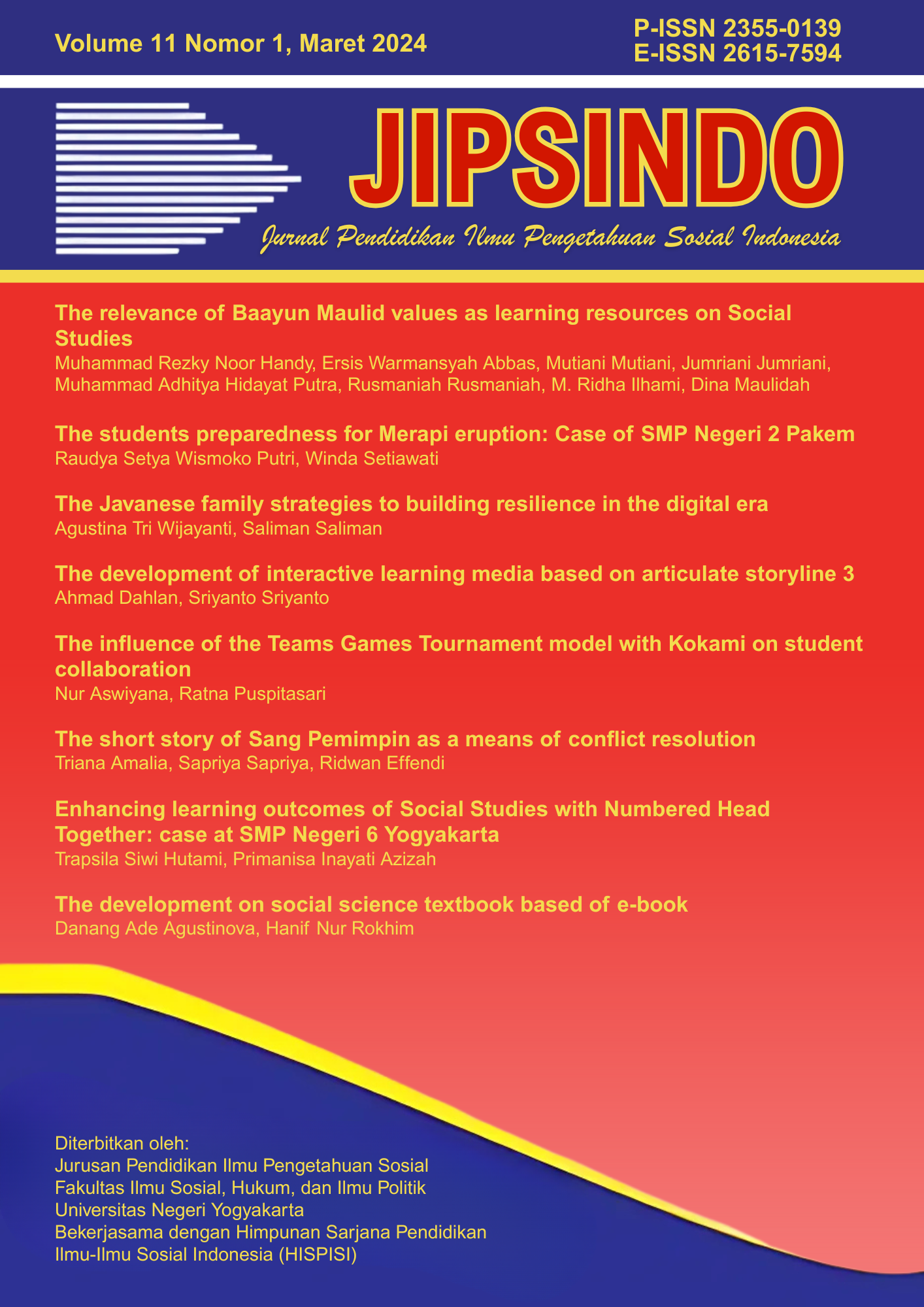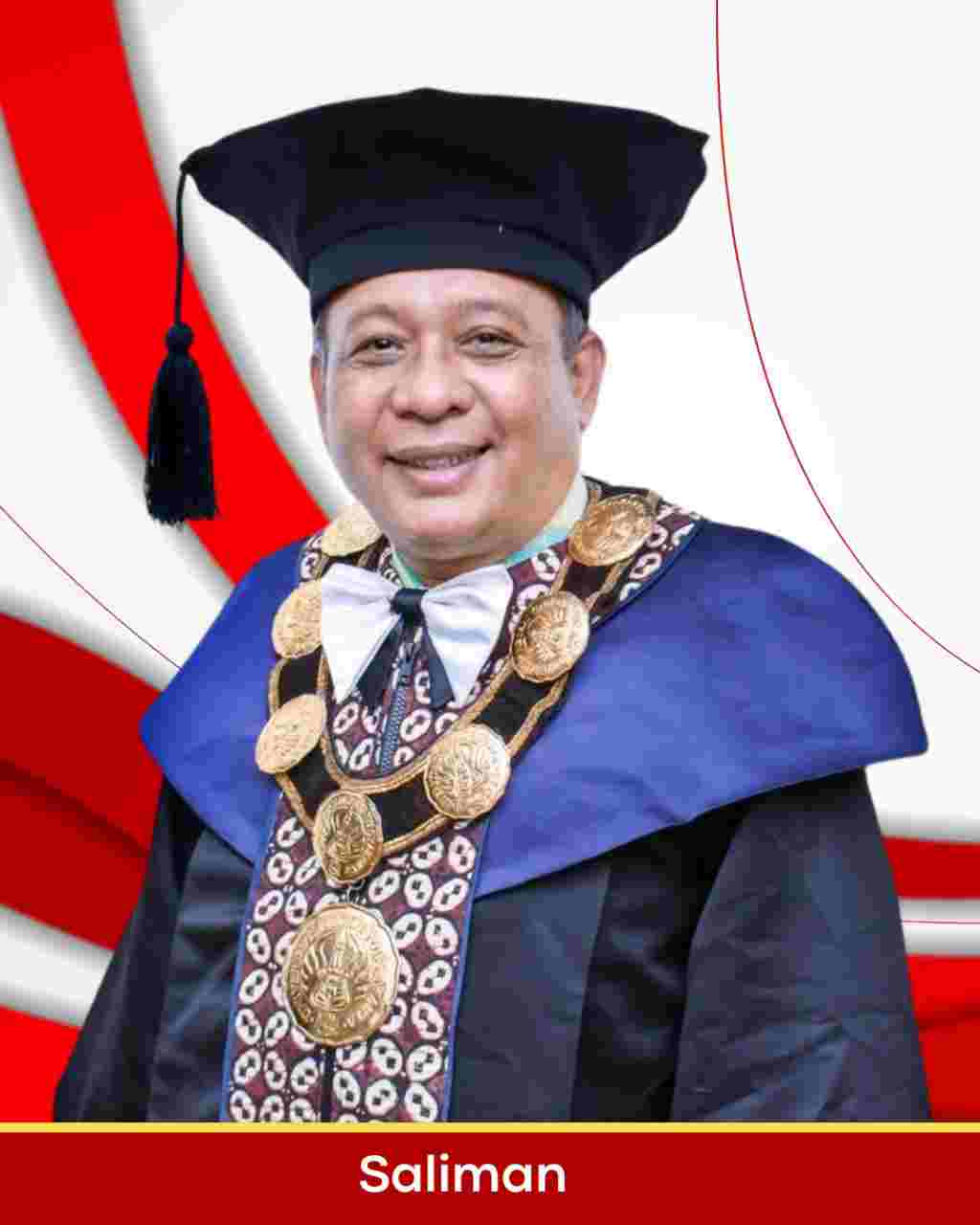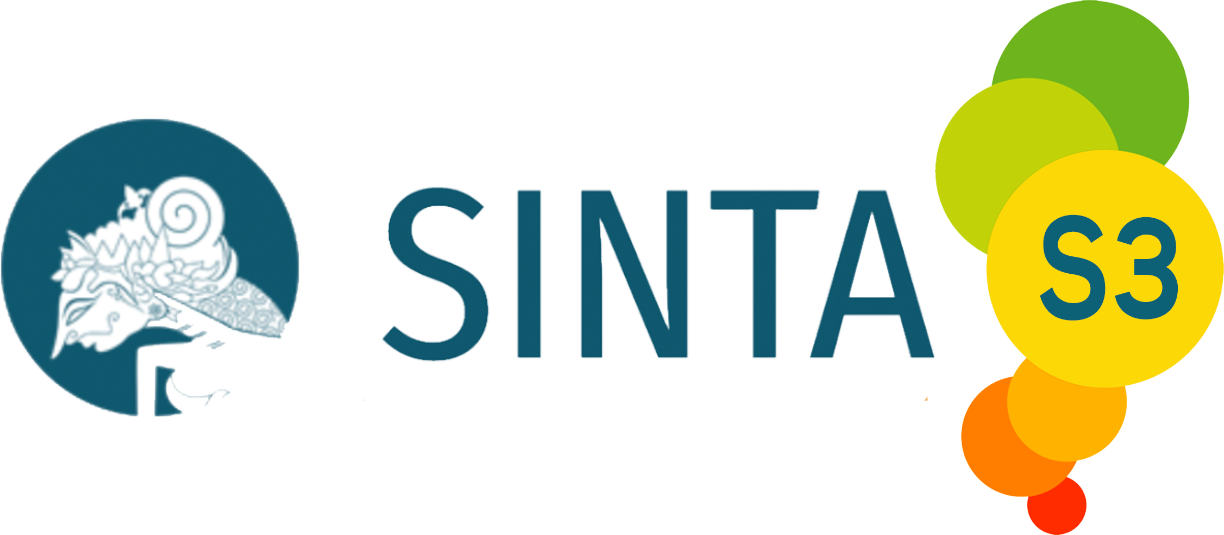The students preparedness for Merapi eruption: Case of SMP Negeri 2 Pakem
DOI:
https://doi.org/10.21831/jipsindo.v11i1.65648Keywords:
Disaster, Preparedness, Mount Merapi EruptionAbstract
This study aims to find out: (1) the level of preparedness of students of SMP Negeri 2 Pakem students to face the Merapi eruption disaster, (2) the efforts made by the school to improve their preparedness to face the Merapi eruption disaster, and (3) the school's constraints in improving their preparedness. This study used mixed methods. The research model was a sequential exploratory design. The data were collected through questionnaires, interviews, and documentation. The qualitative data trustworthiness was enhanced by source triangulation involving 3 sources, namely the Principal, Social Studies teacher, and disaster preparedness school manager. The quantitative data were analyzed using the descriptive statistical technique. The qualitative data were used to support the quantitative data. The results of the study are as follows. 1) The level of preparedness of students of SMP Negeri 2 Pakem is high with a mean score of 141.93. The percentages of the student's preparedness to face the Mount Merapi eruption disaster are very high (34%) and high (66%). 2) The efforts made by the school to improve the preparedness of students of SMP Negeri 2 Pakem students include the provision of disaster socialization and simulation every year, the integration of disaster preparedness materials into the curriculum of learning, the school's provision of facilities related to the disaster preparedness school and an MoU between SMP Negeri 2 Pakem and SMP Negeri 2 Ngaglik as a buffer school during the Mount Merapi eruption disaster. 3) The school's constraints in improving preparedness are, among others, that not all materials can be integrated with the implementation of the disaster preparedness school, simulation and socialization conducted only once a year are considered not being maximal enough, and there is a student shift every year.
References
Abdurrahman, O., dkk. (2011). Hidup di atas tiga lempeng. Badan Geologi Republik Indonesia
Angraini, L. M., Syamsuddin, S., Wirawan, R., Qomariyah, N., & Sukrisna, B. (2019). Pendampingan Sekolah Siaga Bencana Sebagai Upaya Mitigasi Bencana di SMK Kehutanan Qomarul Huda Lombok Barat. Jurnal Pengabdian Magister Pendidikan IPA, 2(1). https://doi.org/10.29303/jpmpi.v1i2.263
Ansori, M. H., & Santoso, M. B. (2020). Pentingnya Pembentukan Program Sekolah Siaga Bencana Bagi Kabupaten Bandung Barat. Prosiding Penelitian Dan Pengabdian Kepada Masyarakat, 6(3), 307. https://doi.org/10.24198/jppm.v6i3.22975
Assyakurrohim, D., Ikhram, D., Sirodj, R. A., & Afgani, M. W. (2022). Metode Studi Kasus dalam Penelitian Kualitatif. Jurnal Pendidikan Sains Dan Komputer, 3(01), 1–9. https://doi.org/10.47709/jpsk.v3i01.1951
Ayub, S., Kosim, K., Gunada, I. W., & Zuhdi, M. (2019). Model Pembelajaran Kesiapsiagaan Bencana Gempabumi Di Sekolah Dasar. ORBITA: Jurnal Kajian, Inovasi Dan Aplikasi Pendidikan Fisika, 5(2), 65. https://doi.org/10.31764/orbita.v5i2.1187
BNBP, B. &. (2013). Rencana Aksi Rehabilitasi dan Rekonstruksi Wilayah Pasca Bencana Erupsi Gunung Merapi di Wilayah Provinsi D.I.Yogyakarta dan Jawa Tengah Tahun 2011-2013. Jakarta: BNBP.
Bramasta, D., & Irawan, D. (2020). Mitigasi Bencana Gunung Meletus di Sekolah Rawan Bencana. Publikasi Pendidikan, 10(2), 154. https://doi.org/10.26858/publikan.v10i2.13858
Dillashandy, N. A., & Panjaitan, N. K. (2019). Kapasitas Adaptasi dan Resiliensi Komunitas Menghadapi Bencana Erupsi Gunung Merapi. Jurnal Sains Komunikasi Dan Pengembangan Masyarakat [JSKPM], 2(5), 617–626. https://doi.org/10.29244/jskpm.2.5.617-626
Jannah, A. M., Sari, I. M., Keperawatan, S. I., & Kesehatan, I. (2023). Gambaran Kesiapsiagaan Mayarakat Menghadapi Bencana Gunung Meletus di Dukuh Gebyog Samiran Selo Boyolali. Jurnal Ilmiah Kesehatan Masyarakat, 2(1), 4–6. https://doi.org/10.55123/sehatmas.v2i1.994
Lesmana, C., & Purborini, N. (2015). Kesiapsiagaan Komunitas Sekolah dalam Menghadapi Bencana di Kabupaten Magelang (Preparedness of School Communities in Facing Disasters in Magelang District). Jurnal Teknik Sipil, 11(1), 15–28.
Lestari, S., & Winanto, A. (2022). Efektivitas Model Pembelajaran Inquiry dan Problem Based Learning terhadap Kemampuan Memecahkan Masalah Matematika Siswa Sekolah Dasar. Jurnal Basicedu, 6(6), 9967–9978. https://doi.org/10.31004/basicedu.v6i6.4203
Malthuf, M., & Reza, M. H. (2022). Kontribusi Guru Geografi Dalam Mitigasi Bencana Erupsi Gunung Merapi. WAKTU: Jurnal Teknik UNIPA, 20(02), 110–115. https://doi.org/10.36456/waktu.v20i02.5892
Muktaf, Z. M. (2017). Wisata Bencana: Sebuah Studi Kasus Lava Tour Gunung Merapi. Jurnal Pariwisata, IV (2), 84–93. http://ejournal.bsi.ac.id/ejurnal/index.php/jp84
Oman Abdurrahman, d. (2017). Hidup Di Atas Tiga Lempeng. Bandung: Badan Geologi.
Rahmat, H. K., Kasmi, & Kurniadi, A. (2020). Integrasi dan Interkoneksi antara Pendidikan Kebencanaan dan Nilai-Nilai Qur'ani dalam Upaya Pengurangan Risiko Bencana di Sekolah Menengah Pertama. Prosiding Konferensi Integrasi Interkoneksi Islam Dan Sains, 2, 455–461. http://sunankalijaga.org/prosiding/index.php/kiiis/article/view/440
Rifai, M. H. (2018). Pengaruh Penggunaan Media Audio Visual Terhadap Pemahaman Konsep Mitigasi Bencana Pada Mahasiswa Pendidikan Geografi. Jurnal Pendidikan Dan Pembelajaran, 3(1), 62–69.
Rizkia Mutiara Ramadhani, Fitri Andrianti Indah Gustaman, Muhammad Sarip Kodar, I. K. W. (2020). JIPSINDO, No.2, Vol.7, September 2020. Jurnal Pendidikan Ilmu Pengetahuan Sosial Indonesia, 7(2), 162–176.
Rozi, S. (2016). Memahami Erupsi Merapi Kebijakan dan Implementasi. Yogyakarta: Graha Ilmu.
Santosa, L. W. (2015). Keistimewaan Yogyakarta Dari Sudut Pandang Geomorfologi. Yogyakarta: Gadjah Mada University Press.
Sasmito, N. B., & Ns, P. (2023). Faktor Hubungan Kesiapsiagaan Keluarga dalam Menghadapi Dampak Bencana. Journal of Education Research, 4(1), 81–91. https://doi.org/10.37985/jer.v4i1.129
Satriyo Wibowo, A. S. (2017). Pemahaman Menejemen Bencana Siswa Smp Di Kabupaten Sleman. Jipsindo, 4(1), 1–21. https://doi.org/10.21831/jipsindo.v4i1.14834
Septikasari, Z., & Ayriza, Y. (2018). Strategi Integrasi Pendidikan Kebencanaan Dalam Optimalisasi Ketahanan Masyarakat Menghadapi Bencana Erupsi Gunung Merapi. Jurnal Ketahanan Nasional, 24(1), 47. https://doi.org/10.22146/jkn.33142
Santosa,L, G. (2015). Keistimewaan Yogyakarta dari sudut pandang geomorfologi. Gadjah Mada University Press
Sudrajat, S. (2021). Potensi Candi Asu sebagai sumber belajar IPS di sekolah menengah pertama. JIPSINDO (Jurnal Pendidikan Ilmu Pengetahuan Sosial Indonesia), 8(2), 150-164. doi: https://doi.org/10.21831/jipsindo.v8i2.43702
Sudrajat, S., & Mujadidi, S. (2023). Implementasi program sekolah siaga kependudukan di Kabupaten Pemalang Jawa Tengah. JIPSINDO (Jurnal Pendidikan Ilmu Pengetahuan Sosial Indonesia), 10(2), 100-114. doi: https://doi.org/10.21831/jipsindo.v10i2.63743
Sudrajat, S., Saliman, S., & Supardi, S. (2022). The evaluation of the programs of gender-responsive schools in Yogyakarta. Jurnal Penelitian dan Evaluasi Pendidikan, 26(1), 87-97. doi: https://doi.org/10.21831/pep.v26i1.47886
Sudrajat, Saliman, Supardi. (2022). Sketsa Pembelajaran IPS: Menuju Pembelajaran Abad 21. Penerbit Adab
Sudrajat, Kumalawati, M. (2020). The Environmental Awareness of Junior High School Students in Sleman Yogyakarta, 14th International Conference of Social Science and Education. DOI:10.2991/978-2-494069-55-8_16
Sugiyono. (2018). Metode penelitian kombinasi (Mixed Methods). Bandung: Alfabeta.
Undang-Undang RI Nomor 24 tahun 2007 Tentang Penanggulangan Bencana.
Wiratmoko, D. (2017). Situs Geopark Gunung Sewu Geo Area Pacitan Sebagai Sumber Belajar Ilmu-Imu Sosial. Jipsindo, 4(2), 150. https://doi.org/10.21831/jipsindo.v4i2.17573
Downloads
Published
How to Cite
Issue
Section
License
Authors who publish with this journal agree to the following terms:
- Authors retain copyright and grant the journal right of first publication with the work simultaneously licensed under a Creative Commons Attribution License that allows others to share the work with an acknowledgement of the work's authorship and initial publication in this journal.
- Authors are able to enter into separate, additional contractual arrangements for the non-exclusive distribution of the journal's published version of the work (e.g., post it to an institutional repository or publish it in a book), with an acknowledgement of its initial publication in this journal.
- Authors are permitted and encouraged to post their work online (e.g., in institutional repositories or on their website) prior to and during the submission process, as it can lead to productive exchanges, as well as earlier and greater citation of published work (See The Effect of Open Access).

JIPSINDO (Jurnal Pendidikan Ilmu Pengetahuan Sosial Indonesia) is licensed under a Creative Commons Attribution-ShareAlike 4.0 International License.
Based on a work at https://journal.uny.ac.id/index.php/jipsindo.













